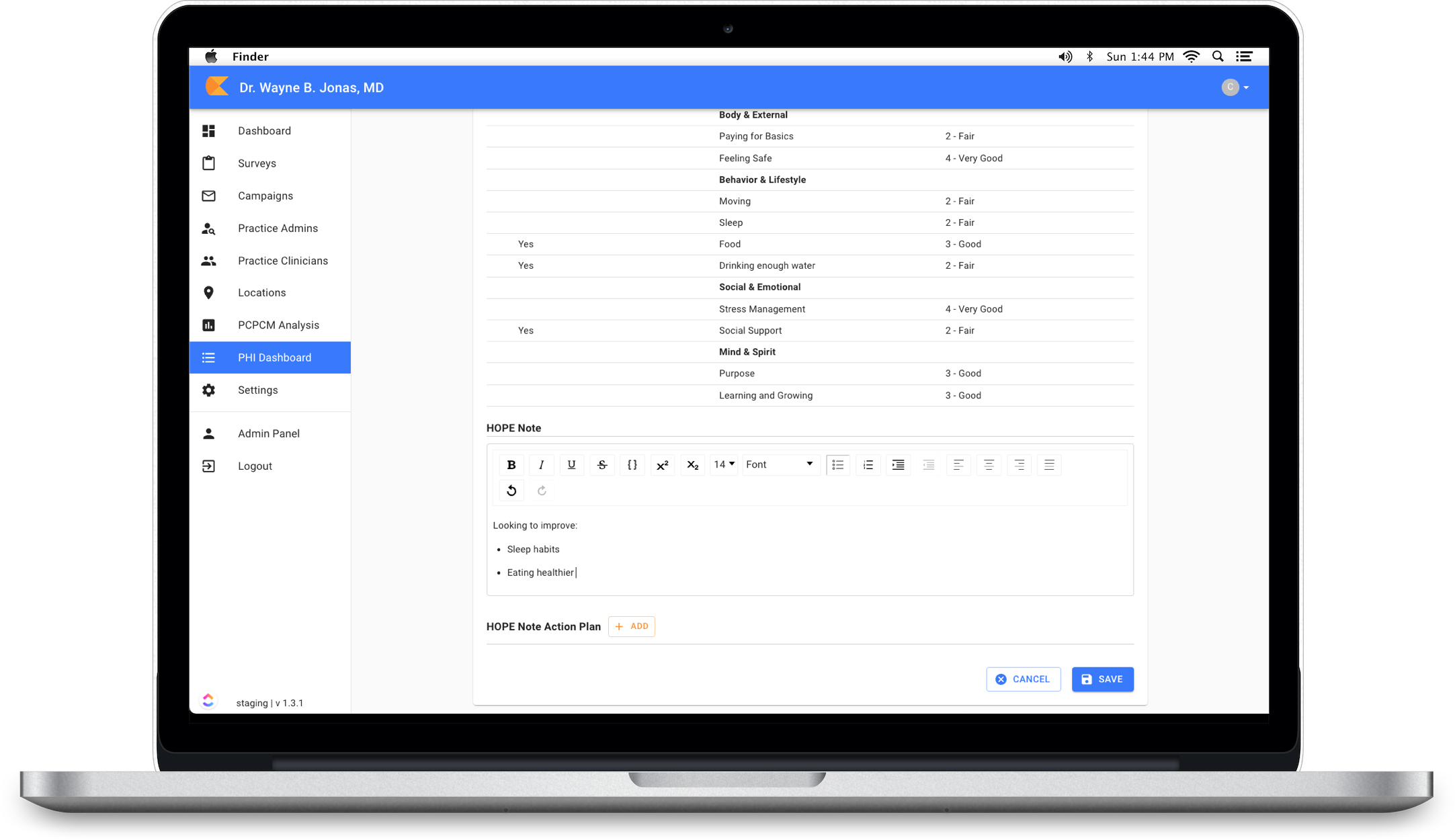Whole Person Care should be
THE PERSONAL HEALTH INVENTORY (PHI)
The personal health inventory provides a better understanding of your patient and the internal and external influences on their health. This image illustrates the many layers that factor into a person’s ability to heal.
BODY & EXTERNAL
The outer layer represents the body and the environment. External factors influence health as much as the cellular environment.
BEHAVIOR & LIFESTYLE
The next layer represents the behavior and lifestyle of the individual. What foods do they normally eat? How often do they exercise? What brings them joy?
SOCIAL & EMOTIONAL
These factors have an impact on health and wellbeing. What are the components of the patient's support network? Are their emotional and mental health needs being met?
SPIRITUAL & MENTAL
The center comprises the spiritual and mental factors influencing the patient's capacity to heal. The questions explore their sense of purpose, meaning, and personal growth.
Whole Person Primary Care
Whole person primary care is just good medicine. It is person-center, relationship-based care. Using a conversation tool, like the PHI, it accounts for the social, spiritual, emotional, and behavioral aspects of health, as well as the environment in which the person lives by using a conversation tool like the PHI.
Whole person primary care requires an integrative approach to be effective. It coordinates the delivery of evidence-based conventional medical care, complementary medicine, and lifestyle medicine.
Incorporating a whole person approach into mainstream primary care practices enables physicians, nurses, and other health care clinicians to:
Deliver higher quality advanced primary care
Improve patient outcomes and satisfaction
Lower costs
Reduce burnout
CLICK HERE to preview the Primary Care PHI.
A Whole Person Approach to Cancer Care
Chemotherapy, radiation, and surgery are the pillars of conventional cancer treatments. These treatments often cause side effects and affect a patient's quality of life.
Incorporating a whole person, integrative approach allows patients to discover ways to support and bolster their tolerance of conventional cancer care. Whole person cancer care adds self-care, behavior, and lifestyle resources, as well as evidence-based complementary therapies to restore quality of life to patients.
Providers can learn what is most important to patients and what they are struggling with by having conversations driven by the Oncology PHI tool.
CLICK HERE to preview the Oncology PHI.
Fielding the PHI with EASY
At Smart Measures, our EASY platform plays a crucial role in efficiently managing the PHI. Through this platform, healthcare clinicians can collect, track, and analyze Personal health data with ease.
Clinicians can streamline the data collection processes, improve patient care, and enhance overall operational efficiency.
WHY USE EASY?
Digital Data Collection
Patients input their health information directly into the system using user-friendly online forms available on desktop and mobile. This ensures accuracy and eliminates the need for manual data entry.
Digital Note-taking
Clinicians enter patient notes directly into the PHI using their mobile or desktop device. This provides a central location to manage both historical and future notes for that patient.
Secure Data Storage
We prioritize data security and ensure that all personal health information stored on the EASY platform is encrypted and protected to maintain confidentiality and comply with regulations.
Interested in learning more about the EASY platform?
SIGN UP
Keep Exploring
Learn more about the science and practice of implementing whole person care in primary care and oncology from the Healing Works Foundation, a non-profit foundation dedicated to making whole person, integrative care the standard of care.
FAQ
-
All you have to do is fill out the SIGN UP form and someone from Smart Measures will reach out to you with next steps.
-
Visit The Healing Works Foundation website to learn more.
-
The Personal Health Inventory (PHI) is made up of a number of questions related to whole person care.
CLICK HERE to preview the Primary Care PHI
CLICK HERE to preview the Oncology PHI -
Pricing Is primarily based on the number of clinicians In your practice. The EASY platform was designed to be affordable to organizations of all sizes.










